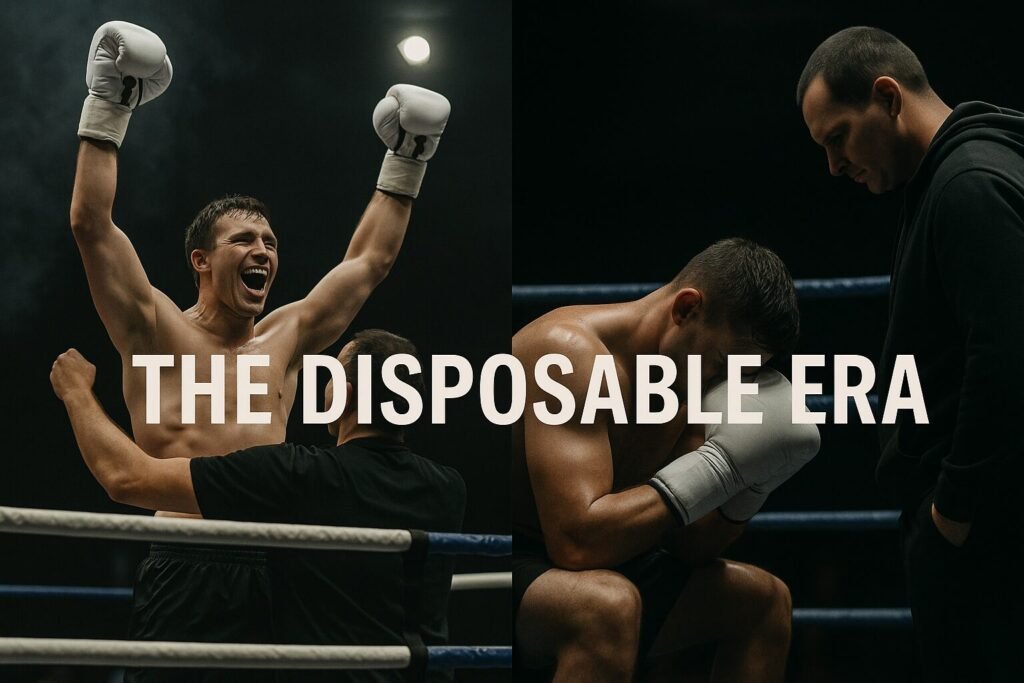n modern boxing, changing trainers has become as casual as changing gloves — and it’s getting ridiculous. One flat performance, one tough night, one awkward post-fight interview… and suddenly the coach is the villain, the problem, the dead weight holding the fighter back.
We’re living in what I can only describe as the “boxing trainer loyalty era” — ironically defined by a complete lack of loyalty.
Before we get going, a quick internal link for anyone who hasn’t read it yet:
The Loyalty Problem in Boxing: The Truth No One Wants to Admit
Right — let’s get into it.
Camp-Hopping: Boxing’s New Fashion Trend
Scroll through recent years and you’ll see it: fighters treat their corner teams like they’re scrolling through Tinder.
Swipe left on the guy who built you.
Swipe right on the “super-trainer” who’s trending on social media.
Swipe again when your next fight doesn’t go viral.
From Anthony Joshua jumping between setups, to Ryan Garcia’s never-ending conveyor belt of coaches, fighters now act as though a new trainer is a magic reset button — something that instantly fixes flaws they’ve spent ten years ignoring.
Even reputable outlets like Sky Sports, ESPN, and The Ring Magazine have commented on how unstable corner relationships are becoming. It’s not gossip — it’s the reality of modern boxing.
The Social Media Effect: Everyone Wants a Shortcut
Part of the problem? Instant-results culture.
Fans want quick knockouts. Fighters want quick breakthroughs. Promoters want quick headlines.
If you don’t look incredible every second of a fight, Twitter/X decides you need a new coach.
You can’t even slip a jab without someone tweeting “He needs to leave his trainer ASAP.”
Fighters listen to it. They shouldn’t — but they do.
The result? We get panicked camp changes that make absolutely no sense, followed by confused performances where the fighter looks caught between two different styles.
Real Chemistry Takes Years — Not Two Camps
Look at Naoya Inoue. Look at Terence Crawford. Look at Canelo Álvarez.
These aren’t just world-class talents — they’re the product of years of consistent coaching.
Years of building trust.
Years of refining details most casuals will never even notice.
The “boxing trainer loyalty era” doesn’t mean blind loyalty to a failing setup. It means having a long-term plan and sticking to it.
But too many fighters act like a new trainer can magically fix:
- Footwork that’s been neglected for a decade
- Defensive habits baked in since the amateurs
- Discipline issues outside the gym
- Mental lapses that have nothing to do with pad work
A coach can guide you.
A coach cannot reinvent you every three months.
The Risks: More Than Just Mixed Messages
This disposable approach comes with consequences — and fighters are paying the price.
1. Ruined Chemistry
A trainer needs time to understand a fighter’s pace, temperament, and instinct. Change trainers too often, and you lose that connection completely.
2. Mixed Training Philosophies
One trainer wants high guard.
Another wants shoulder roll.
Another wants you bouncing on your toes like Lomachenko.
What do you get? A fighter who looks like three different fighters in the same round — and none of them very good.
3. Shortened Careers
Constant tactical resets lead to physical resets — different conditioning routines, different strategies, different sparring partners. That inconsistency takes years off careers.
4. Overthinking Everything
The worst thing a boxer can do? Think too much in the ring.
And nothing causes overthinking like a fighter trapped between instructions from three different coaches over three different fights.
When Loyalty Works — And When It Doesn’t
Let’s be clear: loyalty for the sake of loyalty is stupid.
If a trainer isn’t improving you or the chemistry is dead, you move on.
But at least have a plan.
Some fighters genuinely need a change. Others use the switch as a convenient excuse after a loss.
The real question is:
Are we losing the art of long-term development because everyone wants a shortcut?
I think we are.
Not every trainer is perfect. But the best corners — the ones that change careers — are built through time, trust, and patience. All three are becoming rare commodities in the sport.
Final Bell: Has Boxing Forgotten How to Build Fighters?
The “boxing trainer loyalty era” has become ironic.
It’s meant to be about loyalty.
Instead, it’s a revolving door.
If fighters and promoters don’t start valuing consistency again, we’re going to see more careers derailed by panic moves masked as masterplans.
But that’s just my take — now I want yours.
Your Turn: Let’s Talk About It
Do you think fighters sack trainers too quickly?
Is social media pushing bad decisions?
Or is modern boxing simply evolving?
Share your thoughts in the comments, repost on X, or head over to CMBoxing for more honest, no-nonsense boxing talk.
And if you enjoyed this, please share it — it helps the site more than you know.

